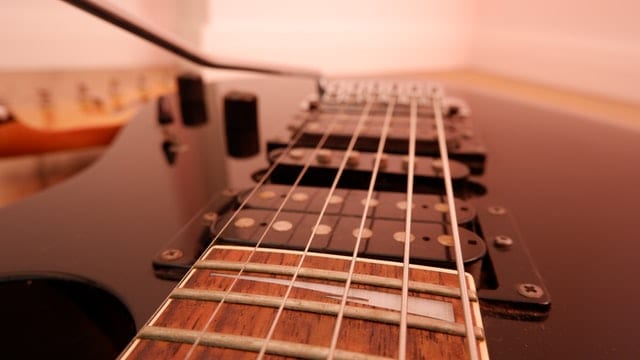Let’s face it: Nobody likes changing strings.
Some of us even go to great lengths to avoid doing it when it’s long overdue.
When strings start to decay, you first notice they begin to get a bit rough, then gradually they start sounding darker and lifeless.
But do old guitar strings really lose intonation? And why does that happen?
Old guitar strings do lose intonation as they wear down and get rust and debris attached to their surface. This alongside common use deformation from grinding against the frets causes them to vibrate irregularly along their span, causing the different notes to sound out of tune with each other.
In this article, I will dive deep into what causes guitar strings to lose intonation when they are at the end of their usable lifespan.
After leaving this page you will have a clearer idea about what causes strings to lose intonation, how long it usually takes, and what are your alternatives for preventing it.
Are you ready to get started?
Let’s go!
Why do worn-out guitar strings sound out of tune?
Guitar strings are the most important part of your instrument. Actually, they are the piece of it that is constantly in contact with your hands.
And that contact comes at a price.
You see, human hands are naturally disgusting, and although I sound like a robot saying this, let me explain.
It’s inevitable that when you are playing your hands start sweating and secreting skin oils. Sweat and oils are rapidly captured by the strings.
This moisture on the strings causes them to rust faster, and also to be more prone to getting debris attached to them. And this debris actually can be dead skin shavings, among other nasty things.
Not only this but also strings can get slightly deformed with their use. Think of their constant grinding against the frets, nuts, and bridge.
When you mix all of these occurrences, the rust, the debris, and the deformation, it’s easy to understand that their mass, which originally was rather uniform, gets a bit unbalanced along their span.
So, strings that were designed to vibrate evenly now can’t do that.
But the thing that ultimately makes strings lose intonation or sound out of tune is that the debris buildup and deformation happens irregularly along them, so different notes end up ringing with slightly different alterations.
To completely understand this, think of the impossibility of the strings gaining mass from dirt and nasty things uniformly as if they were coated.
If this were the case, they would just become more massive, and tone aside, they would still maintain proper intonation, only that you would probably have to change the tension required to make them vibrate in standard tuning.
Is there a way of solving this without changing the strings?
When strings have already decayed there is not really much to do with them.
You could try boiling them and performing a deep cleanse with appropriate products, but there’s not much hope for them anyway.
Maybe you can get one or two extra weeks out of them, but this is never a sustainable solution.
What’s a bit more scalable is taking preventive steps every time you play to make sure you elongate their lifespan as much as possible.
How can you prevent strings from losing intonation?
The best way to make sure your strings last as long as possible without losing intonation is by creating the good habit of always washing your hands before playing, and wiping them before and after your session.
Also, storing your guitar, or using a cloth to cover the strings while it’s not in use, will help towards your goal.
This might sound simple, but it’s actually the only reliable way of getting more out of your precious strings.
There are some products that claim to help you get a deeper clean and increase their lifespan, but I will leave you to experiment with them on your own since I honestly don’t have that much experience with them.
I can assure you, however, that there are no magic formulas, and sooner or later you will have to get a new string set if you want your chords and playing to sound in tune across the fretboard.
Are there any strings that last longer?
There are certain brands of strings that come with a chemical coating that improves their lifespan, for instance, Elixir strings are known for this.
Of course, these coated strings come at a premium, so the obvious analysis here is if their lifespan is prolonged enough to be cost-effective.
And without getting too deep into the economics of the matter, I can argue that they are really worth it.
On average coated strings tend to last at least twice as regular strings do.
However, and as with anything, your mileage might vary, and I encourage you to do your own experiments with it.
How often should you change your strings to prevent this issue?
Guitar strings are usually expected to last for 3 months with regular use.
Of course, it will depend on how heavy and often you practice or play gigs. Even on how many guitars you have and use regularly because obviously the wear will be distributed among their string sets.
The deterioration of the strings, however, tends to be linear and progressive. It will be so gradual that you will probably not notice how your sound darkens, but when the loss of intonation is big enough, you will surely perceive it.
So, the 3 months are not something set in stone, and you will surely start to get a feel for what is the current condition of your strings as you play more and more.
It is a good habit to change your strings regularly since worn-out strings will not only sound worse and have intonation issues, but also could accelerate the natural wear of your playing on your guitar frets and fretboard.
More about that in the following article:

Hello there, my name is Ramiro and I’ve been playing guitar for almost 20 years. I’m obsessed with everything gear-related and I thought it might be worth sharing it. From guitars, pedals, amps, and synths to studio gear and production tips, I hope you find what I post here useful, and I’ll try my best to keep it entertaining also.





